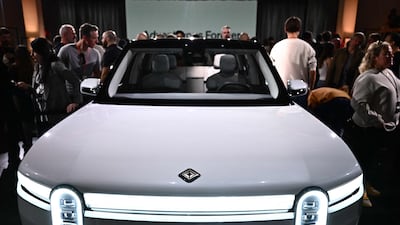Rivian Automotive, the US electric vehicle manufacturer, has unveiled its new line-up of its most affordable sport utility vehicles, aiming to challenge the dominance of Elon Musk's Tesla Motors.
The California-based company is hoping the more attractive price points for its R2 and R3 EVs will entice more users, which in turn would prop up a market that has experienced a downturn in the past year.
“Our design and engineering teams are extremely focused on driving innovation into not only the product features but also our approach to manufacturing to achieve dramatically lower costs," RJ Scaringe, founder and chief executive of Rivian, said in a release on its website.
What did Rivian launch?
Rivian introduced three EVs, headlined by the R2, a mid-sized five-seat SUV "optimised for big adventures and every day use".
The other two are the R3 crossover and R3X, the latter of which is the high-performance option.
The design of the EVs are "distinctly Rivian", though with a first and quick glance you might mistake them for Range Rovers with unique headlights. Nevertheless, Rivian describes them as "inviting and iconic" and "immediately recognisable".
How much are Rivian's new EVs?
The R2 is expected to start at about $45,000 and while the R3 models' prices have not yet been revealed, Rivian said they would be even lower than the R2 – which would make them the company's most affordable options by far.
That would be more than a third cheaper compared with the R1T, which starts at $69,900, and less than half the price the R1S, whose base model is $91,000, according to current prices on its website.
For comparison, market leader Tesla – which introduced several price cuts to prop up demand – is offering the Model Y and Model 3 from $36,490 and $35,990, respectively, but that's after federal tax credit and other incentives in the US. The Model X and Model S start at $68,590 and $71,090, respectively.
Rivian is now accepting reservations for the R2 for a refundable deposit of $100.
When will the R2 and R3 be available?
Rivian previously announced the R2 would be available in 2026, without any specifics. With the launch of the new EVs, however, the company said deliveries for the R2 were now expected in the first half of that year.
Deliveries of the R3 and R3X, on the other hand, will start after the R2, "to ensure a smooth launch and rapid ramp of R2". All EVs will be available outside the US following their North American launch, the company said.
How many R2s will be manufactured?
While Rivian did not specify how many R2s will be made, it said it will increase production at its hub in Normal, Illinois, to 215,000 units a year.
That would be a significant jump from the 57,232 EVs it manufactured – 50,122 of which were delivered – in 2023, Rivian said in its full-year report, also released on Thursday.
The 2023 figures for both manufacturing and deliveries, however, were more than double – 147 per cent – compared with 2022, it said.

For comparison, Tesla manufactured 1,845,985 EVs in 2023, delivering 1,808,581. Production of EVs other than its Model 3 and Model Y alone, which hit 70,826, outpaced Rivian's 2023 total.
Rivian’s production plant in Georgia will also play a key role in its plans, remaining "an extremely important part of its strategy to scale production of R2 and R3", the company said.
What are the special features of Rivian's new EVs?
The R2 and R3 EVs have three motor variants – single, dual and tri – with the quickest configuration delivering zero to 97kph in under three seconds.
Its structural battery, an all-new 4695 cell, promises about 483km on a single charge, offering "significant improvements in energy density and output". Its fast-charging capabilities can power the vehicles from 10 per cent to 80 per cent in less than 30 minutes.
Rivian said it also boosted its self-driving platform as the R2 and R3 have a new "perception stack" that has 11 cameras, five radars and a "more powerful compute platform", providing "dramatically enhanced autonomous capabilities", supported by frequent software updates.


